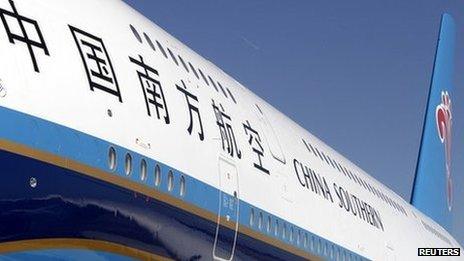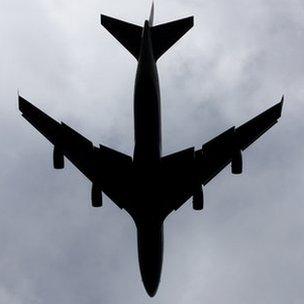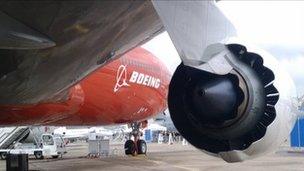Is the aviation boom sustainable?
- Published

Asia's aviation boom is set to keep the aircraft makers busy for decades yet
As the aerospace industry gears up for next week's Dubai Airshow, serious doubts are hanging over the future of the global economy. Yet the mood within the civil aerospace business is remarkably upbeat.
Flying is more popular than it has ever been. Once seen as a luxury that only a privileged few could afford, air travel has become a genuine form of mass transport over the past few decades.
Improved technology, deregulation and the introduction of low-cost business models have made it ever more accessible. During the period from 2000 to 2010 alone, the number of passengers carried worldwide increased by 45%.
It is a remarkable statistic, the more so given the setbacks that affected the industry during that period.
The 2001 attacks in New York and Washington had a profound effect on the air transport market, particularly in North America.
Further shocks followed, such as the Sars disease outbreak in South-east Asia, an oil price spike and successive economic downturns.
Yet through all of this, overall passenger numbers continued to climb.
Managed growth
The question now is whether that rate of growth can be sustained.
The two commercial aerospace giants Boeing and Airbus believe it can. Airbus is forecasting, external a further doubling of passenger numbers within the next 20 years.
It also believes that that between now and 2030, airlines will need to order more than 29,000 new aircraft to cater for increasing demand and to replace ageing and obsolete models.
Boeing takes a similar view, external. It predicts that airlines will need more than 33,000 new aircraft over the same period.
This is not simply a case of talking up the market, or of looking at the future through rose-tinted spectacles.
Such forecasts help the aerospace giants plan for the future, enabling them to focus their resources efficiently, manage their production lines and target where investment will be most needed.
And if the big beasts of civil aerospace are predicting strong demand for new aircraft, that is also good news for the network of suppliers and contractors they rely on.
Growing middle class

Making money from transporting people and goods by plane is tough
The reason for their confidence lies in Asia, which is experiencing something of an aviation boom, underpinned by rapid economic expansion in India and China.
Twenty years from now, a third of all air traffic is going to come from the Asia-Pacific region, according to Airbus chief operating officer John Leahy.
"India and China are growing very fast and that means they're getting a growing middle class," he says.
"The middle class fly for business, they fly for leisure. In 20 years, we expect five billion people around the world to be middle class.
"That's an awful lot of demand for air travel."
Financing the expansion
Yet greater passenger numbers do not automatically translate into higher profits - and the confidence of the big manufacturers is not reflected elsewhere within the aviation world.
"The overall air transport industry does create a lot of value," says Brian Pearce, chief economist of the International Air Transport Association (IATA).
"The manufacturing side is very profitable and customers get a fantastic deal."
But for the airlines themselves, he says, it is a different story.
"It's one of the most competitive industries around. There are a couple of thousand commercial airlines and they compete intensively for business. The consequence is that very few airlines actually make any money."
Airlines are also directly exposed to the effects of economic slowdown, while the cost of fuel can have a major impact on their profitability.
It is a situation Mr Pearce believes could ultimately curb the growth of the sector as a whole, as cash-strapped carriers struggle to invest in new aircraft.
"The fact that the airline part of the industry doesn't make any money could potentially mean it is more difficult in future to raise the money to finance that expansion," he says.
'Undesirable growth'

Although engines are more efficient than in the past, emissions remain a problem
But there is another factor that could impinge on the growth of the industry. Carrying more passengers means flying more and bigger planes, and burning more fuel.
For many environmental campaigners, the question is not whether aviation can continue to grow, but whether or not it should actually be allowed to.
Jos Dings is director of the Brussels-based lobby group Transport and Environment. He says the environmental impact of aviation needs to be curbed urgently.
"Currently the emissions from the aviation sector stand at 4.9% of the global total, while its economic contribution is less than 1%", he says.
"We haven't done anything to remediate those emissions, and they grow more or less in line with passenger growth, so if that trend isn't broken, then I would say this passenger growth is not good news for the planet at all."
Polluters pay
Those figures would be contested by many within the industry itself. Airbus's John Leahy, for example, claims that aviation accounts for 8% of global economic output.
He adds that despite the near doubling of air traffic from 2000 to 2010, fuel consumption increased by just 3%, thanks to more efficient aircraft and better traffic management.
Nevertheless, there are signs that, in some regions at least, legislators are looking carefully at the sector.
From next year, all airlines that fly to and from airports within the European Union (EU) will have to take part in the region's emissions trading scheme.
The amount of carbon dioxide they can emit will be capped. If they pollute too much, they will have to pay for the privilege.
It is a controversial measure, which has attracted opposition from many airlines as well as from foreign governments. But the EU is pushing ahead regardless.
On its own, it is unlikely to have much impact on the global growth of aviation. Yet it does set a precedent for passing the environmental costs of air transport on to the airlines themselves - and, indirectly, onto passengers.
It is a principle that is likely to attract increasing attention over the next few years - and it could have a much greater impact on the industry in the long term if governments elsewhere take similar steps.
Yet while the struggles of cash-strapped airlines and the prospect of more onerous environmental legislation could slow the growth of aviation, most experts predict passenger numbers will keep on climbing.
And the reason for that is sheer weight of numbers. If millions more people can afford to fly, they say, the chances are that is exactly what will happen.
The Dubai Airshow runs from 13 to 17 November 2011.